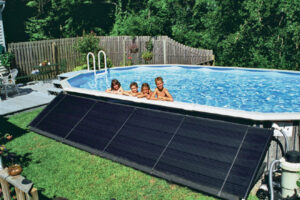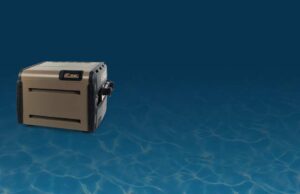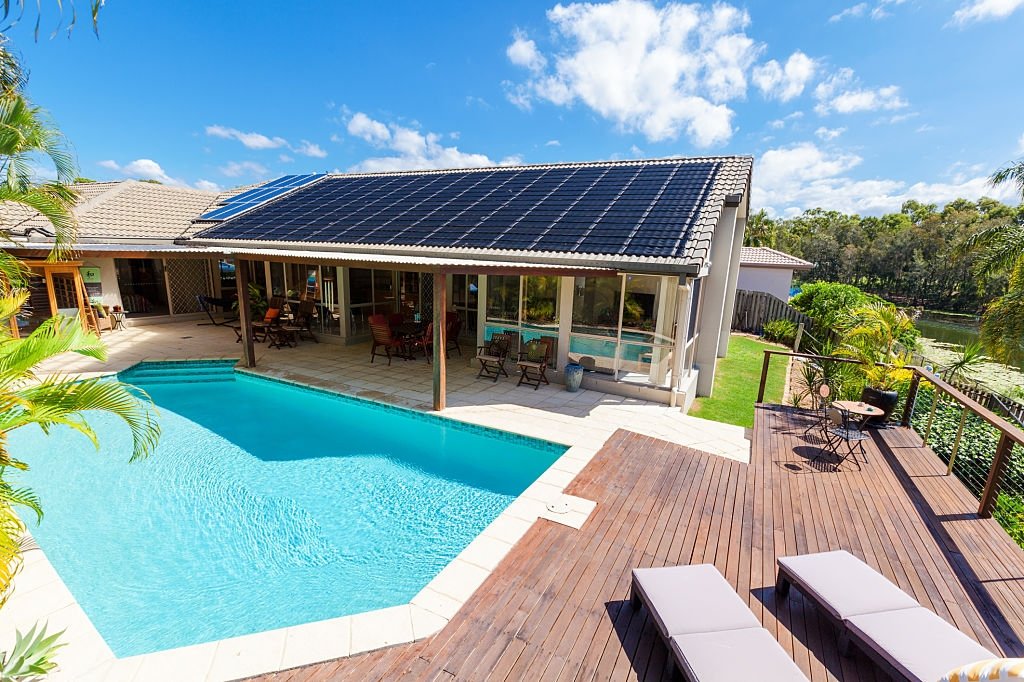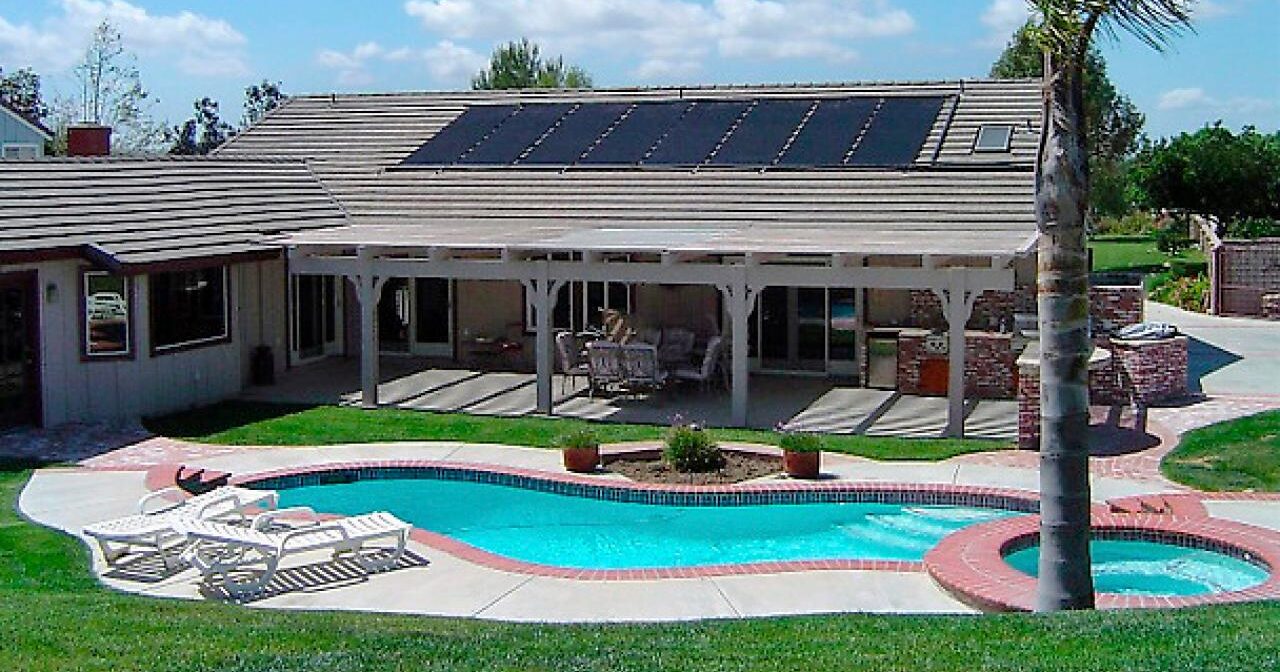Table of Contents
Pool heaters are an essential commodity if you live in relatively cooler regions. They help prolong your swimming sessions and ensure a warm time underwater.
Selecting a pool heater might seem like a straightforward task. However, when you step into the fray, you will find numerous elements to consider.
In this article, we will cover each factor, in brief, to give you an idea of sizing your pool heater right the first time.
What type of pool heater are you opting for?
The purchase of a pool heater begs the question, what type are you going to need? There are many ways to heat your swimming/spa pool, some efficient, some not. A few pool heaters are suitable for larger volumes, and a few others are perfect for small indoor pools.
The main types of pool heaters that homeowners opt for these days are,
 Solar pool heaters
Solar pool heaters
As the name suggests, solar pool heaters utilize roof-fitted solar panels that use solar energy to heat your pool. These systems are eco-friendly, inexpensive to operate, and have a long shelf-life. However, they cost bucketloads upfront and heat the water depending on the number of UV rays they can absorb. The entire heating system requires considerable space for installation, and bigger pools need more space.
 Electric heating pumps
Electric heating pumps
Electric heat pumps utilize the air around them, pulling the heat in and transferring it to the pool water. While they are just as eco-friendly and energy-efficient as solar pool heaters, they have their drawbacks. Electric pool heaters need the surrounding temperature at 55° F and heat the pool relatively slow.
 Gas-powered pool heaters
Gas-powered pool heaters
Gas pool heaters utilize a combustion chamber to burn propane or natural gas and transfer the heat to the pool water. The gas heaters cost less, do not depend on the surroundings, and heat the pool efficiently and quickly. On the other hand, they have a short shelf-life, cost more to operate, and are not eco-friendly.
Sizing your pool heater
No matter what type of pool heater you purchase, it gets sized uniformly in BTU or British Thermal Unit. BTU indicates the amount of energy/heat required to raise the temperature of one pound of water by one degree Fahrenheit.
A general rule of pool heaters is: the larger the pool dimensions, the higher the BTU rating. For example, a pool holding 10,000 gallons of water will require an equal or more than 50,000 BTU in a pool heater.
Factors that affect sizing a pool heater
It is essential to bear in mind that calculating a few elements of pool heater sizes will not give a precise result. There are multiple variables like changing wind velocities and pool surface area that affect the size.
A pool heater has to overcome the constant heat loss first to begin maintaining a consistent pool temperature. Here are a few factors that will help you make an informed decision when sizing your pool heater.
Pool Volume
For straight-walled pools, the general formula in feet goes as follows.
Average length x Average width x Average depth x 7.5
For a no-constraint pool with free-form or slanting walls, the general formula is as such.
Average length x Average width x Average depth x 7

Acceptable water temperature
No matter what the purpose of your pool, whether for leisure or training, it requires a comfortable temperature in which to swim. Determine what water temperature is needed in Fahrenheit to get a suitable size of a pool heater.
Hot tubs or spas attached to the swimming pool would require higher temperature considerations.
Surrounding air temperature
If you reside in warmer regions, the pool heater would not require much BTU to heat the pool. In colder areas, the pool heater would have to overcome the surrounding air temperatures plus heating the cold water, thereby, requiring a higher BTU. Also, if you need the heater to maintain the heat, it would add to the total BTU measurement.
An example to relate to
Every individual pool will have unique conditions that the pool heater has to face. Here is an example you can use as a reference that includes the various pool heater sizing considerations.
The pool dimensions are 16 inches in length x 32 inches in width x 5 inches of depth.
The approximate pool volume would get rounded to 20,000 gallons. Also, we assume that the acceptable pool temperature that the owner likes to swim in is 80° Fahrenheit.
To calculate the BTU required, we first convert 20,000 gallons into pounds or lbs.
The water constant is 8.3 lbs. for every gallon of water.
So, 20,000 gallons = 20,000 x 8.3, which will give us 166,000 lbs. of water.
Here, to raise the temperature of 166,000 lbs. water, we need 166,000 BTU of energy. (Since it takes one BTU to heat one pound of water by one degree Fahrenheit)
Next, we calculate the temperature differential.
The ideal water temperature that the owner requires is 80° Fahrenheit. In calculating the surrounding air temperature, we assume the worst-case scenario and set the temperature to 50° Fahrenheit.
Hence, the pool heater would have to raise the water temperature from 50° Fahrenheit to 80° Fahrenheit.
Then comes calculating the time required to heat the water.

We know that the temperature difference is 30° Fahrenheit that the heater must overcome. Once again, we assume a 24-hour window in which the heater must/can heat the water.
Here, the 24-hour bracket is merely for reference purposes. You could employ a smaller pool heater for the task and get it to heat the water. Only, it will take longer than the 24-hour time frame.
Now, to heat the 20,000 gallons/166,000 lbs. of water with a temperature gradient of 30° Fahrenheit, the amount of BTU required would be,
166,000 x 30 = 4,980,000 BTU
To gain a BTU/hour value, we divide the 4,980,000 BTU/24 hours to get,
4,980,000 / 24 = 207,500 BTU/hour
In the end, you would require a pool heater of a minimum of 207,500 BTU to heat a 20,000-gallon pool from 50° Fahrenheit to 80° Fahrenheit within 24 hours.
This value is not an exact reference since we made many assumptions to suit the example. In reality, you would not generally require the pool heating facility to meet the given temperature measurements.
‘Bigger is better’ mentality of sizing a pool heater
No one likes to wait around when the urge to swim hits them. In such times, having a large pool heating unit comes handy to heat the pool water quickly.
The mentality of having large BTU pool heaters is merely to cover the aspect of time-saving. Any professional pool heater installer, when sizing up a pool heater according to your specifications, will not make a precise measurement.
They do not incorporate wind speeds or external factors, or surface-area differences. Instead, they determine the essential pool heater BTU according to the above example reference. Then, oversize its capacity by 20-25% to accommodate for the extra efficiency losses.
In contrast, if you employ a smaller pool heater, it would take more time to heat the pool and operate longer. This reason is why it becomes a norm to avail of a pool heater of a larger-than-required size.
Final thoughts
The type of pool heater, the amount of heat required, the pool volume, and climatic factors form significant factors in determining the pool heater size. There are a few more variables that you will understand, only after you get the pool heater installed.
Nevertheless, the given information and example should serve as foundational data to make a satisfying decision on the pool heater size.
